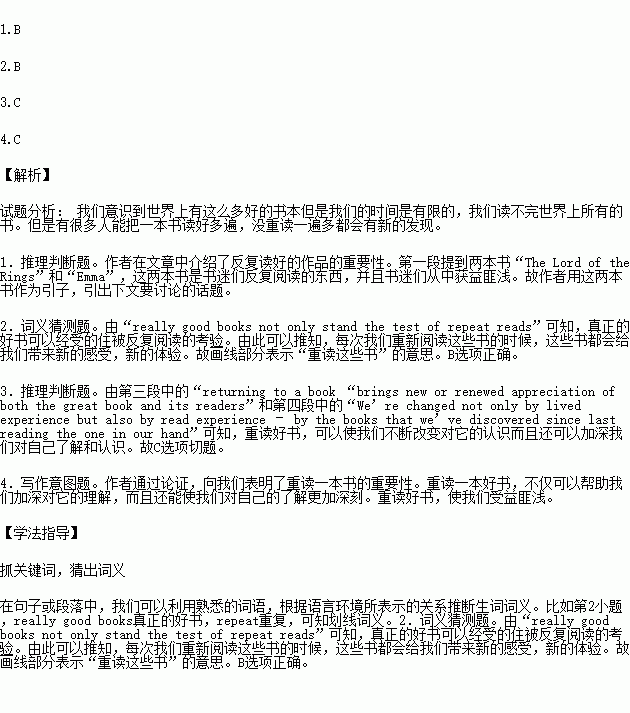题目内容
As we grow old, we realize that we have so little time to read and there are so many great books that we’ve yet to get around to. Yet re-readers are everywhere around us. For certain fans, re-reading The Lord of the Rings is a conventional practice annually. One friend told me that Jane Austen’s Emma can still surprise him, despite his having read it over 50 times.
New sudden clear understandings can be gained from the process of re-reading. Journalist Rebecca Mead, a long-time Englishwoman in New York, first came across George Eliot’s Middlemarch at 17. Since then, she has read it again every five years. With each re-reading, it has opened up further; in each chapter of her life, it has resonated (引起共鸣) differently. Mead evidenced the large number of ways in which really good books not only stand the test of repeat reads, but also offer fresh gifts each time we crack their spines. These kinds of books grow with us.
Scientists have also recognized the mental health benefits of re-reading. Research conducted with readers in the US found that on our first reading, we are concerned with the “what” and the “why”. Second time round, we’re able to better appreciate the emotions that the plot continues to express. As researcher Cristel Russell of the American University explained, returning to a book “brings new or renewed appreciation of both the great book and its readers.”
It’s true that we often find former selves on the pages of old books (if we’re fond of making notes on the pages). These texts can carry us back to a time and place, and remind us of the kind of person that we were then. We’re changed not only by lived experience but also by read experience—by the books that we’ve discovered since last reading the one in our hand.
More so than the movie director or the musician, the writer calls upon our imaginations, using words to lead us to picture this declaration of love or that unfaithfulness in life. A book is a joint project between writers and readers, and we must pour so much of ourselves into reading that our own life story can become connected with the story in the book.
Perhaps what’s really strange is that we don’t re-read more often. After all, we watch our favourite films again and we wouldn’t think of listening to an album only once. We treasure messy old paintings as objects, yet of all art forms, literature alone is a largely one-time delight. A book, of course, takes up more time, but as Mead confirms, the rewards make it adequately worthwhile.
1.The two books are mentioned in Paragraph 1 mainly to ________.
A. attract the attention of readers
B. introduce the topic of the passage
C. provide some background information
D. show the similarity between re-readers
2.The underlined expression “crack their spines” in Paragraph 2 refers to ________.
A. recite them B. re-read them C. recall them D. retell them
3.It can be learned from the passage that ________.
A. reading benefits people both mentally and physically
B. readers mainly focus on feelings on their first reading
C. we know ourselves better through re-reading experience
D. writers inspire the same imaginations as film directors do
4.The purpose of the passage is to ________.
A. call on different understandings of old books
B. focus on the mental health benefits of reading
C. bring awareness to the significance of re-reading
D. introduce the effective ways of re-reading old books



 ),并在其下面写出该加的词。
),并在其下面写出该加的词。